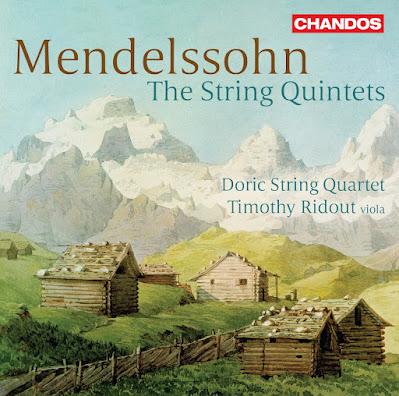Following on from their two volumes of Felix Mendelssohn’s String Quartets, the Doric String Quartet are now joined by Timothy Ridout (viola) for a disc of his String Quintets. Mendelssohn wrote just two of these, going with the viola added to string quartet combination, favoured by Mozart and Brahms, as opposed to adding a cello, which Boccherini and Schubert did. Mendelssohn’s String Quintet No. 1, composed when he was 17, came hot on the heels of the successful premiere of his glorious Octet. Ever the reviser, it was another five years before he published both. Its opening movement has a leisured warmth, with only brief hints of darker moods in its development, before it gently dances to a quiet ending. The Intermezzo, with its singing melodic idea is sensitive and elegiac. Intensity builds over warm lower strings, with the rhythmic pace of the throbbing repeated figure increasing. It never feels totally settled, despite its calm ending. We’re in ‘A Midsummer Night’s Dream’ territory in the Scherzo, with skittering fairy music led off by the first viola. The players here give this precision and clarity, yet avoid it becoming too dry, and there is some dramatic scraping from the cello, not holding back from a harshly biting timbre. Yet once again, the movement disappears into nothing. Whilst not quite reaching the heights of exuberance of the Octet, the finale is full of joyful energy, set up by its lively triplet upbeat. Alex Redington on first violin shines in the rippling runs, and sings over the rumbling lower instruments. Energy levels ramp up and up, leading to the joyous conclusion. The String Quintet No. 2 came some 18 or so years later, with much of the same sense of energy but perhaps less of the unfettered joyfulness of his youthful works. The opening movement has an athletic first violin part over a tremolo accompaniment. The whirling triplet rhythms mean there is always a sense of movement, and these drive on, becoming more insistent, building to a full-on emphatic conclusion. In the dancing, lilting staccato of the second movement, once again the players here avoid it becoming to picky, maintaining a sense of the melodic material and the dance in an masterclass of control. But it is the intense pathos of the slow movement – essentially a funeral march – that is most striking about this work. From a darkly pianissimo opening, cello scales rise and a slow relentless march emerges. There are drum-like battering effects, and heartfelt laments from the violins. A nostalgic A major melody provides some temporary relief, but it is short-lived, and the agitation of the march increases. Yet Mendelssohn can’t leave us totally in the dark, as the movement suddenly turns at the end to a triumphant D major, before subsiding into a gentle, calm end. The finale, perhaps a little incongruously after the deep intensity of the previous movement, bursts forth with a jolly, energetic theme. This theme provides most of the material here, and its contrapuntal development perhaps loses a little direction at times, but Mendelssohn eventually pulls everything to a suitably emphatic close. Throughout these fascinating and underperformed works, the Doric String Quartet and Ridout are alive to the Mendessohnian flashes of joy and energy, yet they are also alert to the finer detail. They know when to provide warmth, but also when to give edge to their sound too. Highly recommended.
Arc I is the first of a series of three recordings by American pianist Orion Weiss. This first album features three works from the years 1911-1913. Weiss describes the trajectory of the series as like an inverted rainbow, and this first volume’s ‘steps here head downhill, beginning from hope and proceeding down to despair’. We’ll have to wait for the next disc to see things reach their lowest before renewal and rebirth are promised in the final volume. So here we begin with Enrique Granados’ (1867-1916) Goyescas, Op. 11, a Romantic masterpiece of invention. From the warmly expressive, watery cascades of the opening movement ‘Los reuiebros’ (Flattery), through to the macabre, stuttering dance of the final ‘Epilogo: Serenata del espectro’ (Epilogue: Serenade of the Ghost), this monumental and atmospheric suite is full of Granados’ extravagantly ornamented and improvisatory virtuosity. Weiss is commanding in the frenzied, passionate outbursts in ‘El Amor y la Muerte – Balada’ (Love and death – Ballade), but equally delicate in the nightingale’s song of the fifth movement. There’s a skip in his step in the moments of courting in the opening movement, and he ends the suite with ominous tolling bells before disappearing with a final mercurial wisp. Leoš Janáček’s (1854-1928) In the Mists follows – a shorter suite, and more introspective than the Granados. There are typical Janáček chromatic twists and turns in the melodies, and his motif of death, the falling minor third, features large. Weiss captures particularly well the claustrophobic, suppressed passion of the final movement, which breaks out with melismatic, singing outbursts and increasing intensity, before defeat in its dark sombre conclusion. Weiss ends with Alexander Scriabin’s (1871-1915) Piano Sonata No. 9, Op. 68, ‘Black Mass’. Full of ‘satanic’ tri-tones and chromaticism, begins hopeful but descends into darkness and despair, and Weiss makes the low rumblings and persistent trilling effects feel chillingly ominous. There is a real sense of the second, more hopeful melodic idea insistently writhing as if trying to escape, before being ultimately subsumed into a frightening march. This is an impressive display from Weiss, and sadly speaks to current anxieties and a sense of despair. Arc II promises to take us to the lowest point of grief and loss, but hopefully Arc II will bring us some hope for the future – much needed at present.
Various. 2022. Arc I - Granados, Janáček, Scriabin. Compact Disc. First Hand Records FHR127.
(Edited versions of these reviews first appeared in Scene, May 2022)








